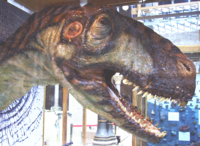Eustreptospondylus
2007 Schools Wikipedia Selection. Related subjects: Dinosaurs
| iEustreptospondylus |
||||||||||||||||||||
|---|---|---|---|---|---|---|---|---|---|---|---|---|---|---|---|---|---|---|---|---|
 Eustreptospondylus head in the Oxford University Museum of Natural History.
|
||||||||||||||||||||
|
|
||||||||||||||||||||
|
Extinct (fossil)
|
||||||||||||||||||||
| Scientific classification | ||||||||||||||||||||
|
||||||||||||||||||||
|
|
||||||||||||||||||||
| Eustreptospondylus oxoniensis Walker, 1964 |
Eustreptospondylus ("well-curved vertebra", in reference to the arrangement of the spine in the original fossil) was a genus of megalosaurid dinosaurs from the Callovian stage of the Middle Jurassic period (164.7-161.2 million years ago) in southern England, at a time when Europe was a series of scattered islands (due to tectonic movement at the time which raised the sea-bed and flooded the lowland). Eustreptospondylus is thought to have been between 5-7 meters long (17-23 feet) and around 2 meters tall (6 feet 6 in). It was carnivorous, bipedal and had a stiffened tail. It was a typical theropod, with powerful hind limbs, erect posture and small forelimbs.
History
Eustreptospondylus was described originally by Sir Richard Owen, in 1841, as a new species of Megalosaurus ("M. cuvieri"). This specimen, found in a brickpit in the Oxford Clay, north of Oxford, England, has since been lost but its description, when compared to 're-discovered' material, makes it likely that it was indeed from the species Eustreptospondylus oxoniensis. Eustreptospondylus had also, prior to Walker's redescription in 1964, been assigned to the species Streptospondylus cuvieri. In 2000, Rauhut found that only minor differences in the hip bones make Eustreptospondylus different from a previously known megalosaur called Magnosaurus and, in 2003, he proposed that they should be the same genus (which would make the full species name Magnosaurus oxoniensis).
In popular culture
Eustreptospondylus was featured in episode 3 of BBC's Walking with Dinosaurs, "Cruel Sea".